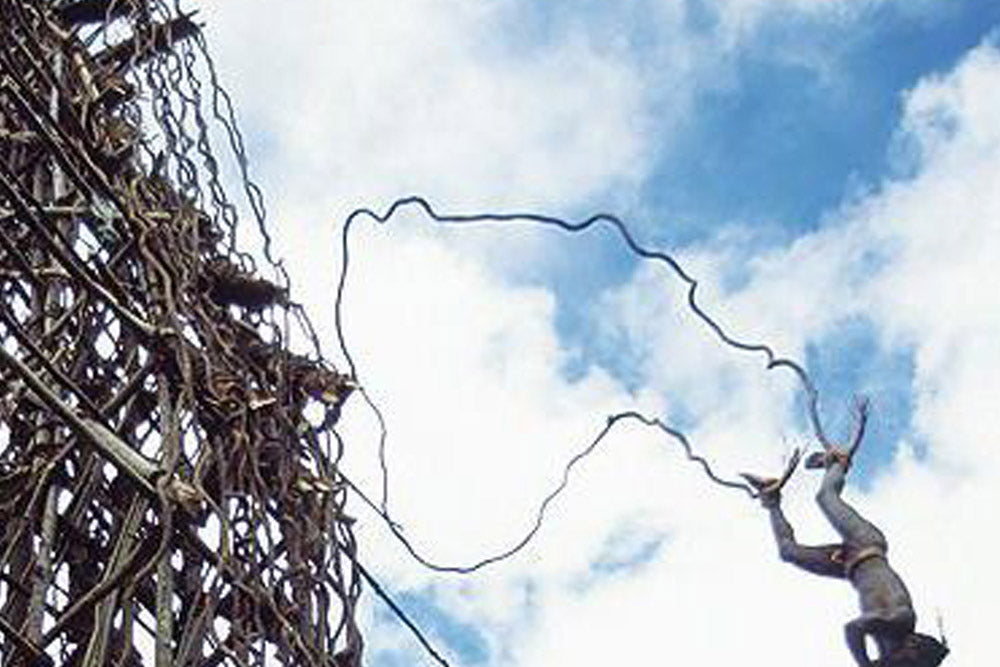

Hundreds of years ago on the tiny South Pacific island nation of Vanuatu, legend has it that a young woman began arguing with her husband, Tamalie. When the argument turned heated, the woman ran from Tamalie, seeking safety in the lush jungle that surrounded the village.
Seeing that her husband had followed in pursuit, the young woman frantically climbed to the top of the tallest tree she could find. But even that could not stop Tamalie from following, as he began making his way to the top of the tree, leaping from branch to branch. Left with no other option, the young woman threw herself from top of the tree only to see Tamalie jump right behind her.
Tamalie plummeted to his death. But the young woman was not so foolish as to plummet from her perch unprepared. Before jumping, she has tied vines around her ankles, which broke her fall moments before crashing to the earth, saving her life.
What may seem like a parable warning about the dangers of domestic unrest has actually given rise to a cultural tradition unlike any in the world.
Land Diving Tradition
As harvest season approaches on Pentecost – one of the many islands that make up the nation of Vanuatu – the men in the village begin preparing for a bountiful yam crop by participating in the annual tradition of land diving.
In the middle of a jungle clearing, a wooden tower that stands between 20 to 30 meters (66 to 98 ft.) in height has been constructed. Between 10 to 20 men per village will climb the tower, and tie vines around their ankles before jumping high into the air. If all goes as planned, the vines will snap taut just in time to prevent the diver from hitting the ground, allowing him to swing close enough so that his shoulders barely brush the soft mud below.
If the practice of land diving sounds familiar, it’s because the tradition dates as the precursor and inspiration for the extreme sport of bungee jumping. Because of the danger and inherent fascination of seeing villagers jump from great heights with no safety equipment in place, the tradition of land diving has turned into one of Vanuatu’s biggest tourist attractions over the last twenty years. But for the men and young boys who participate in the tradition, land diving is much more than a means of bringing in tourists.
A Right of Passage
Local custom says that land diving first began as a way for the men of a village to defiantly prove a woman would not so easily fool them, as Tamalie had been so long ago. Now, the tradition of land diving has evolved to take on a variety of meanings for the men of Vanuatu.
For young boys, land diving marks their transition from childhood into manhood. When a boy feels he is ready to become a man, he will climb to the lowest platform on the tower and make his first jump, as his mother stands proudly watching below. Traditionally, the mother will clutch in her hand some small piece of her son’s childhood, a favorite toy or scrap of cloth. Once her son has successfully completed his jump, the memento from his childhood is thrown away, symbolically putting to an end his time as a boy and welcoming him into manhood.
For village elders, land diving is an annual rite of spring. The villagers of Vanuatu believe that a successful jump will guarantee a bountiful yam crop, and the higher each jumper leaps into the air, the more successful a crop the village will enjoy. Villagers also believe landing diving can improve a man’s health and strength, and serves as an important demonstration of his bravery. However, men unwilling to jump or who back out at the last moment are not viewed as cowards or weak.
Villagers view both the tower and the land dive itself symbolically as a representation of the body and fertility. A man’s choice to dive is his own.
Art of the Dive
For men who decide to jump, the ritual begins with the least experienced divers jumping from the lowest platform on the tower, and ends with a village’s most experienced divers jumping from the very top. A perfect jump involves the diver landing close enough to the ground that his shoulders graze against the soft, tilled soil below. Before making their jump, divers are allowed to sing, give speeches and make gestures. The night before jumping, divers settle all of their personal affairs in case the jump goes poorly.
In order to get his shoulders close to the ground, a diver will cross his arms and tuck his head while in mid-leap. Considering that Guinness World Records ranks the g-force experienced by land divers as the greatest found in the non-industrialized world, this technique leaves the diver vulnerable to suffering severe head, neck and back injury should the vine break or prove too long. Despite the risk, the people of Vanuatu insist that fatalities rarely, if ever, occur from land diving, though no official statistics are tracked.
While tourists are welcomed to watch this sacred tradition play out, the cultural tourism council of Vanuatu is sensitive to the commercialization of land diving. As a result, a maximum of 50 tourists are allowed at each land diving site during the ceremony, and commercial filming of the ritual was banned in 2006. However, skeptics of cultural preservation point out that while land jumping was once practiced only at the beginning of April just prior to the yam harvest, villagers now continue to jump through the month of June in order to satisfy the demands of tourist.
As a patriarchal society, the women of Vanuatu are expressly forbidden to jump. Women are not even allowed near the tower during its construction, as it is believed that the spirit of Tamalie takes root in each one, and will seek his revenge upon those jumping should a woman get too close. Instead, women of the village root on the men by singing and dancing as they take their defining leap; left to remember the legend of how a fateful jump long ago set one woman free.
